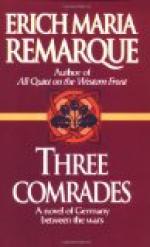The lady promised, but asked that they might now read the Word of God, as she felt tired. They did this very gladly, and in a little while a wonderful quietness reigned.
“Listen, Steve,” said Joe to his comrade; “In the castle they said that when the lady went home after singing in the theatre that gentlemen unhitched the horses from her carriage, and hitched themselves to it and thus drew her along. I am not surprised. Really, when she sings, she can do anything with a person.”
CHAPTER NINE
On Sunday morning the doctor brought some papers. They all had met at breakfast in the hut. When the lady read the letters, she folded Ondrejko in her arms, and half-crying and half-laughing said, “My dear son, now you may really say, ‘our woods,’ ‘our sheep,’ because I have bought it all for you, my Ondrejko, and all this ground. Only I don’t know if I dare say: ‘Our Bacha Filina.’ I cannot, if it were not for you. He himself must decide if he will stay with us. Do tell him that he must stay.”
“Do not ask, Ondrejko,” smiled Bacha. “If you are at all satisfied with me—yes, if you are satisfied with all of us—we all will be glad to stay; isn’t it so, boys?”
“Surely we will be very glad to stay,” answered the herdsmen.
Soon it was known at all three sheepfolds that Madame Slavkovsky had bought Lord Gemer’s estate and that she would deed it to Ondrejko if Lord Gemer would give up her son to her. No one doubted that he would do this, and since the present manager gave notice to leave, because he had been called to manage a different estate, the lady hoped that she would find some other responsible man. She promised everyone a raise in wages as soon as the change of ownership of the estate was recorded and improvements made. Everybody rejoiced. It almost seemed that even the sheep knew that Ondrejko had become their master. It was lovely how they rang their bells.
Over the sheepcotes every once in a while sounded the song which they called the lady’s: “My faith looks up to Thee, Thou Lamb of Calvary.” The boys taught it to everybody who wanted to learn it, and what Slovak would not like to learn a new song? When Aunty Moravec noticed how they all liked it, she confided to Palko that she still had a whole book of such songs from America. Thereupon, Ondrejko begged his mother to sing one of them once in a while. She made no excuses. Every day she taught them a new one, each more beautiful than those before. They did not realize that she taught them the very songs from which she ran away in the home of her parents, and which she would neither hear nor sing there. Bacha permitted the herders from the other sheepcotes to come over to his hut. They loved to come for those songs. They had good voices, clear as the evening bells. The lady even taught them to sing one in four parts. When Sunday came, they practised the whole afternoon, and sang in the evening, so that it sounded over the mountains like a beautiful melody.




